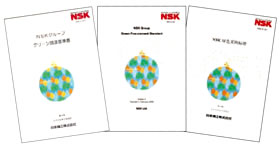- NSK's Approach
- Initiatives in Development and Design
- Initiatives in Procurement
- Initiatives at Plants
NSK's Approach
NSK's Approach : Staying Ahead of Regulatory Progress
The NSK Group is striving to create products that use no environmentally harmful substances, in anticipation of tougher laws and regulations around the world and stricter voluntary standards from its customers. The Group tightly controls environmentally harmful substances through each stage of development and design, procurement, and manufacturing to ensure provision of safe products to customers.
Figure 1: Management of Environmentally Harmful Substances

Initiatives in Development and Design
Product Designs which do not use Environmentally Harmful Substances
The NSK Group appropriately manages approximately 3,000 chemical substances by assigning each one a control rank from among the Group's own ranking of environmentally harmful substances (prohibited substances, reduced substances, and observation substances). Specifically, prohibited substances are not used in products. When reduced substances must be used in a product due to necessity, the designers formulate and implement a reduction plan. When observation substances are used, designers are required to consider switching to alternative substances.
Complying with Regulations
At NSK Group, we not only work to comply with legal requirements, but also with requests from our customers.
In recent years, we have responded to the following changes in regulation.
-
the REACH Regulation
Registration, Evaluation, Authorization, and Restriction of Chemicals (REACH) Regulation: A newly promulgated system regarding the registration, evaluation, authorization, and restriction of chemicals in the EU. -
the EU RoHS
A European Union regulation that sets the maximum concentration limits on hazardous substances used in electrical and electronic equipment. -
ELV directives.
A European Union regulation that aims to reduce the amount of waste from vehicles, ensure proper disposal, and restrict the use of hazardous substances in vehicles.
NSK report Initiatives at Distribution in detail in the CSR report every year.
Initiatives in Procurement
Green Procurement

In addition to the Japanese language edition, the Green Procurement Standards have been translated into English, Chinese etc. for suppliers outside Japan.
Suppliers are asked to agree to the requirements of the Green Procurement Standards Based on these standards, the Group evaluates suppliers' environmental initiatives and the environmental friendliness of the products it purchases and then determines whether to procure the products or not.
Go to the Green Procurement Standards
Auditing Suppliers
All suppliers likely to use environmentally harmful substances are urged to implement a self-audit using check sheets from the NSK Group. The check sheets are prepared to assess each supplier's understanding of the supply chain, clarification of the Group's requirements to suppliers, their management of purchased goods, their management system for environmentally harmful substances, and to verify the absence of these substances. If, as a result of these self-audits, the supplier is assessed as needing an onsite audit, auditors from the Group visit and audit the relevant plants (Picture 2). The supplier will solve the problems identified during the onsite audit and rectify the situation with support from the Group. Efforts toward improvement will be ongoing and follow-up evaluations will be made.
Green Purchasing
Having established its Guidelines for Green Purchasing, the NSK Group pursues green purchasing by selecting environmentally friendly products for general needs such as stationery, office equipment, and vehicles.
NSK report Initiatives at Procurement in detail in the CSR report every year.
Initiatives at Plants
Besides prohibiting certain environmentally harmful substances from being contained in or included with products, the NSK Group has established voluntary rules for reducing environmentally harmful substances handled in the manufacturing process.
Reducing Environmentally Harmful Substances in the Manufacturing Process
In addition to carefully managing the use of environmentally harmful substances in the manufacturing process, we are also undertaking the following initiatives to find non-harmful substitutes.
- Reducing Machining Fluids Containing Chlorine Additives
- Reducing the Number of Oils Containing PRTR-Designated Substances*
- Reducing Emissions of Volatile Organic Compounds (VOCs)
- Complete Elimination of Ozone-Depleting Substances
* The Pollutant Release and Transfer Register Law, a law to facilitate improved environmental management by determining the amount of chemical substances emitted into the environment.
Preventing Leakage of Environmentally Harmful Substances Through Regular Maintenance
The Group is also striving to reduce air and water pollutants by continuously maintaining good conditions through the monitoring and regular maintenance of boilers and wastewater treatment facilities.
NSK report Initiatives at Distribution in detail in the CSR report every year.
